Human resource planning isn’t new. But it’s one of the most important things a business can do well. It’s how you figure out who you’ll need in six months. What kind of skills your team might be missing. Whether the people you already have are being used in a way that actually makes sense for them and for the business.
In this post, we’re looking at the practical benefits of HR planning when you’re trying to grow a business without overhiring, burning people out, or ending up stuck when priorities shift.
We’ll cover:
- The core benefits of human resource planning (in plain terms)
- How it affects people on the ground
- What best practice looks like in 2025
- And where technology fits in when your spreadsheet can’t quite keep up
But first, a quick refresher: what do we actually mean when we talk about HR planning?
What is human resource planning?
Human resource planning is about making sure you’ve got the right people, with the right skills, in the right place, at the right time. It’s part logistics, part foresight. You’re looking at where the business is heading, what kinds of roles or expertise you’re going to need, and whether your current team is set up to get you there.
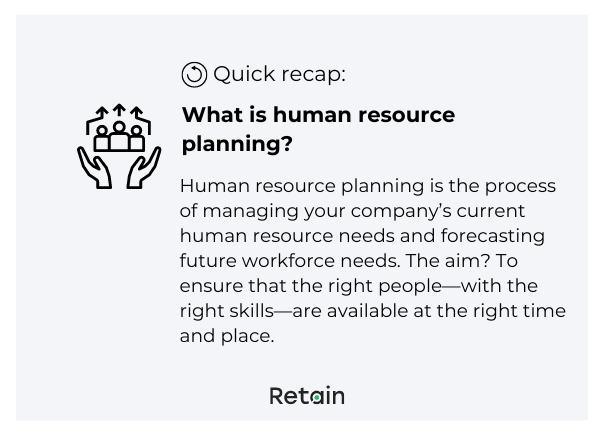
That could mean hiring. It could mean reshuffling. More often, it means identifying gaps early enough that you can actually do something about them, whether that’s training someone internally, or building a plan to recruit for a future need before it becomes a panic hire.
It sounds simple. It’s not. But when it works, it quietly de-risks everything: delivery, culture, reputation, cost.
Top tip: This is something our human resource planning and management software and talent management software does very effectively. (More on this later.)
Your businesses can use it to assess staffing needs, ensuring they can meet the demands of your business and customers. It also helps to avoid any shortages or surpluses in the workforce.
You can then improve your employee management, recruitment, and training, while offering an opportunity for your managers to address employee concerns and to improve job satisfaction. Win-win.
As an interesting side note, most project managers still use Excel for resource planning. Yet while tools like Excel are easily available you have to be aware of their limits. If you're keen to learn more, you'll love our new ebook on how to go beyond Excel for resource planning.
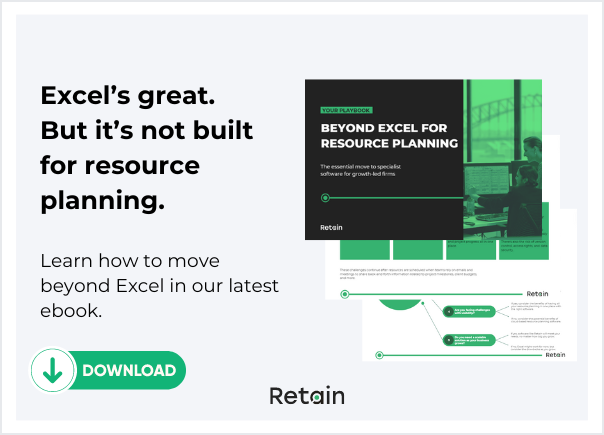
Why human resource planning matters (and what it gives you)

If you’re doing this properly, you’re thinking about future projects, shifting priorities, upcoming deadlines, and asking: who’s going to do the work? And do we have the right mix of people to make it happen?
That’s where human resource planning comes in. It gives you the breathing room to make smarter decisions about skills, timing, team fit, succession, career development, and capacity.
Let’s get into some of the specific benefits. There are plenty, but here are the ones that come up most often in practice.
The benefits of human resource planning
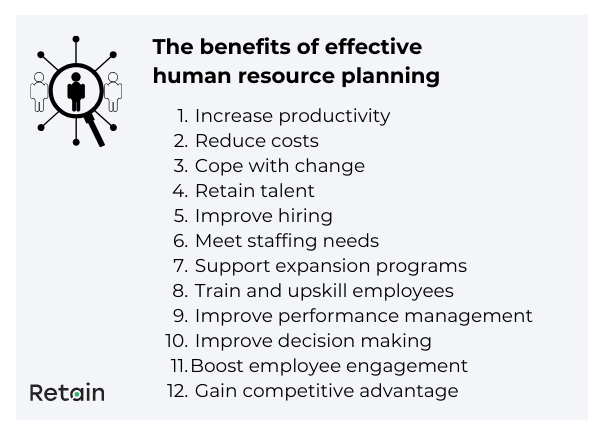
When done well, human resource planning clears space to think, gives managers room to lead, and makes growth feel less chaotic.
At a glance: 12 real benefits of human resource planning
- Higher productivity
- Lower hidden costs
- More resilience to change
- Better retention strategies
- Higher-quality hiring
- Fewer resourcing gaps
- Smoother expansion
- More effective training
- Smarter performance management
- Faster, better decision-making
- Stronger employee engagement
- Long-term competitive edge
Let’s briefly run through each one.
1. Higher productivity
People do better work when they’re in the right roles, not just the ones that need filling. This leads to less firefighting, fewer bottlenecks, and more energy going to the right places.
2. Lower hidden costs
When you are overhiring, urgently outsourcing, or backfilling after surprise exits, the costs add up fast. HR planning helps you avoid the expensive stuff by seeing issues earlier.
3. More resilience to change
Projects shift. People leave. Priorities move. Planning gives you enough visibility to adapt without panic decisions (or awkward reshuffling at the last minute).
4. Better retention strategies
When you know who’s stretched, who’s coasting, and who’s outgrowing their role, you can do something about it. That’s how you keep good people.
5. Higher-quality hiring
Planning forces the right conversations: what do we actually need? Which skills are critical? What could we develop internally? Better questions = better hires.
6. Fewer resourcing gaps
You’re not left short-handed when someone resigns or goes on leave. HR planning gives you enough lead time to line up cover or adjust workloads.
7. Smoother expansion
Growth plans go a lot smoother when you know the talent side is covered, whether you’re hiring for a new location or scaling an existing team.
8. More effective training
It’s easier to target training when you’re clear on what skills are missing. And people are more likely to use it when it’s tied to real projects.
9. Smarter performance management
Performance reviews land better when they’re grounded in actual work, what someone’s done, how they’re growing, where they want to go next.
10. Faster, better decisions
When you’ve got a live view of skills, availability, and demand it means you’re not stuck in spreadsheets. You can move quickly and with more confidence.
11. Stronger employee engagement
People want to feel seen. When planning includes their skills, preferences, and ambitions, they’re more likely to care about the work.
12. Long-term competitive edge
Planning helps you spot emerging gaps before they hurt delivery. That’s how you stay ahead, not just react faster than the next person, but plan smarter too.
Why this matters now
Workforce planning is a growing priority across the board. If you’re starting to feel the pressure, you’re not the only one.
↪ 87% of organisations say they’re already experiencing a skills gap, or expect to within the next few years. (McKinsey, Beyond Hiring)
↪ 70% of business leaders report a critical skills gap that’s hampering innovation and growth
↪ 50% of employees will need reskilling by 2025
↪ 46% of HR leaders ranked HR tech as their number one priority last year
↪ Addressing talent issues is a priority: 26% of CEOs call talent shortages the most damaging risk to business
↪ And when asked what would motivate them to do better work, 37% of employees said recognition (Fortune, Workhuman Study)
What does this tell you?
Skills matter. Systems matter. And the companies that take planning seriously are the ones most likely to hold onto great people and move quickly when it counts.
How does human resource planning affect employees?
It sounds obvious, but while human resource planning has many benefits for businesses, it also positively impacts employees. Here are just a handful of the benefits:
Job security
If you implement HR planning effectively, it should provide employees with better job security by ensuring that your company’s prepared for any changes that may affect the workforce, like downsizing or expansion plans.
Career development
HRP can provide opportunities for your employees to develop skills and advance in their careers. For example, by identifying the skills needed for various roles within your business, HR planning can help you create training programs and career development paths designed to help employees improve their skills and qualifications.
Employee satisfaction
If your employees feel valued and supported, they’re more likely to be satisfied with their jobs and motivated at work. As we mentioned, HR planning can help you create policies that promote the welfare of your employees, including health and wellness seminars, work incentives, and flexible shift arrangements.
Performance management
HRP can also support performance management by providing a standardised process for performance reviews. When managers use a consistent process for evaluating employee performance, it should help create a fair and transparent work environment.
If you’re thinking; “I know the benefits, but how do I actually go about creating a best practice approach to human resource planning?” This next section is for you.
How to use software for human resource planning
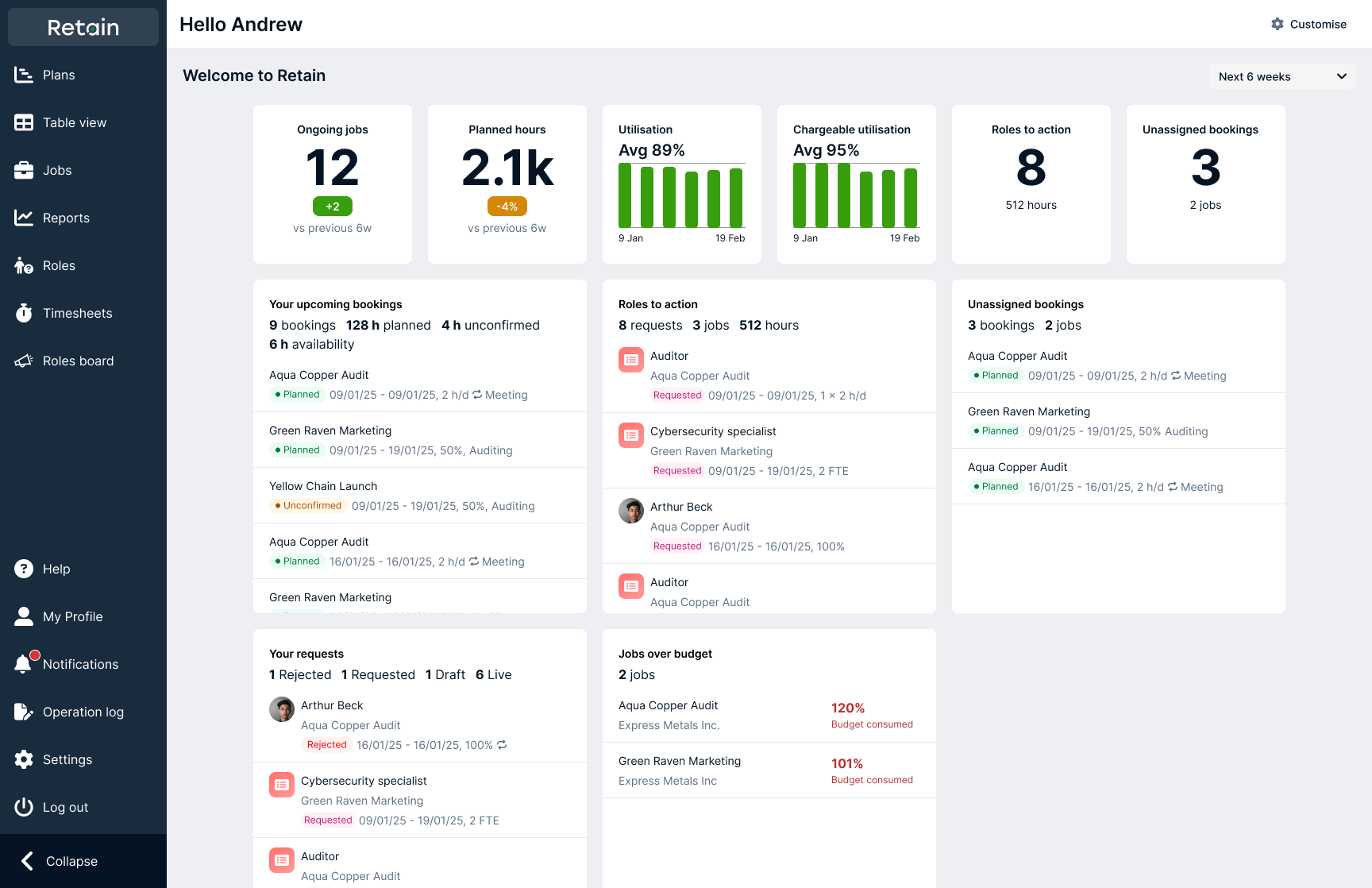
Human resource planning has many moving parts. While it used to be possible to handle them using basic tools, it might be time to consider specialist human resource software once you reach this point:
➡️ You’re struggling with a workforce skills gap and it’s hard to schedule and match projects to the right talent based on skills and availability
➡️ You’re finding it difficult to keep a central repository of talent profiles, skill sets, work experience, and more.
➡️ You don’t have the ability to keep things secure and can’t manage things like access controls, and read, write, and edit access.
To improve human resource planning effectively and sustainably, HR teams should look at more than just updating existing processes.
According to author and Salesforce growth expert Tiffani Bova, there are five main factors that will improve the employee experience, and Bova cites technology as central. At the same time, Gartner reports that 46% of HR leaders say human resource technology was their top priority last year.
A user-friendly human resource management platform, like Retain Cloud solves for all of this. It’s a skills-powered resource planning platform that helps HR and project teams see capacity, demand, and capability all in one place.
Want a deeper look? Check out why professional services firms are choosing Retain Cloud.
Here’s how it helps:
● Skills-first matching: Search by verified capabilities, certifications, behavioural traits, or project experience, not just job title. Retain 2.0 uses AI to suggest best-fit matches, including reasons and skill breakdowns.
● Real-time visibility: See what people are working on now, what’s coming up, and where the gaps are. Filter by department, role, or availability, across the whole business, not just your team.
● Live dashboards: View utilisation rates, unassigned roles, overbooked individuals, and performance metrics at a glance. You get just enough data to act, without wading through spreadsheets.
● Self-service profiles: Let employees update their own skillsets, certifications, and interests. That way, you're not relying on guesswork or outdated info when assigning work.
● 12-month forward view: Forecast resource demand and capacity up to a year ahead, which is ideal for scenario planning, project prep, and headcount conversations.
● Integration-friendly: Retain connects with tools you’re probably already using, including Microsoft Dynamics, Office 365, Salesforce, SAP, IRIS, and more. No messy workarounds or rekeying data.
In short, digital human resource platforms can help you become more efficient, automating manual work such as data entry, reporting, resource skills matching, scheduling, and much more.
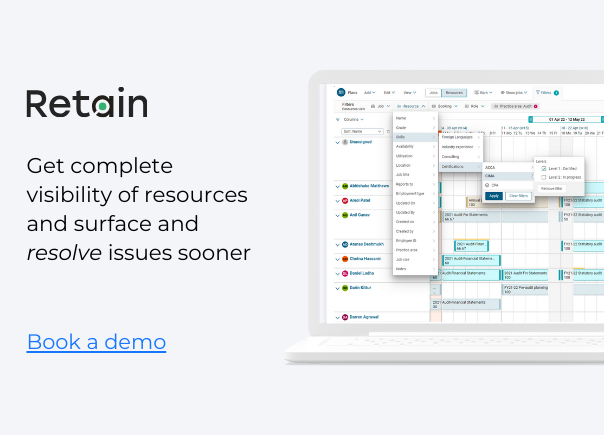
“I really like using Retain Cloud because it’s user-friendly, very flexible, and customisable to your own liking,” says Selmi van Staden, Director, Pitcher Partners. “The onboarding and set-up were quick, with only half a day needed to configure and get the data format right. The customer support team are also very friendly and responsive which is amazing given the time difference.”
What to look for in a resource planning platform
If you’re thinking about making the leap from spreadsheets or legacy tools, here’s what’s actually worth looking for, based on what works in practice, not just what looks good on a product page.
✅ Search by skills, not just roles
You want to match people to work based on what they can actually do, not what their job title says. That means having a clear, shared skills taxonomy and the ability to filter by level, recency, or verified experience.
✅ Live visibility across teams
Planning only works if everyone’s working from the same picture. You’ll need a platform that gives shared visibility across HR, project leads, resource managers without turning it into a mess of permissions and workarounds.
✅ Smart scheduling and forecasting
Look for something that doesn’t just track availability but helps you make decisions: who’s underused, who’s overloaded, what’s coming up, and where the gaps are. Bonus if it gives you a 6–12 month view.
✅ Clear, actionable reporting
You shouldn’t need to pull five spreadsheets just to answer, “Who’s free next week?” Good software gives you simple, live dashboards that actually help you move faster.
✅ Employee profiles people actually update
The best platforms let employees manage their own profiles, such as updating skills, certifications, or preferences in a way that feeds straight into planning. That’s how you surface hidden strengths (and avoid over-relying on the same five people).
✅ Plays nicely with your existing systems
Check integrations with HR, project, and finance tools. The goal is one joined-up view of capacity and cost, not three disconnected ones.
Retain Cloud ticks every one of these boxes because it’s built for the realities of modern HR planning. Skills, scheduling, development, and delivery all in one place.
If you’re ready to see how it works, book a quick demo. We’ll walk you through it, no pressure.
The benefits of human resource planning: A quick round-up
Human resource planning offers various benefits for businesses, giving you better insights into how to grow your business. It’s a vital process that can help you retain top talent, address your staffing needs, and build effective expansion programs, which should help put your business on the path to long-term success.
There’s a lot at stake, employee satisfaction and business growth included.
But you don’t have to go it alone.
Being strategic about how you streamline your HR systems with technology eliminates waste and blockages and allows your business to run more smoothly and more profitably.
Retain Cloud helps you plan with precision, across skills, availability, development, and delivery. It brings the right people together, on the right work, at the right time.
If you’re ready to see how the right HR technology can make your life easier, why not get in touch with us for a personalised demo.


